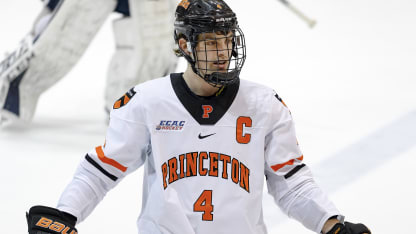From Princeton to Vancouver
...newcomer excited to get started in Vancouver

© Shelley M. Szwast
"If you had asked me five years ago if I'd be in this position, I would have probably laughed out loud...there was just no way," he said with a slight chuckle, shaking his head at the improbability of it all. "Growing up, I wasn't very good. I didn't even play at a high level until I started playing junior hockey and even then I got cut from a lot of teams, played Junior B for a season when I was 18 and always had to fight for my ice time. There was just a lot of adversity, but I was determined to get better."
NEWS | Josh Teves Meets Media
Princeton's head coach Ron Fogarty said it's determination that sets Teves apart.
"We recruited him because we needed an offensive defenseman right away and he showed us that capability in the early stages in Merritt in the BCHL. He was cut the year before and played Junior B in BC and fought his way to Merritt and when he came to Princeton he just continued fighting his way through the lineup," Fogarty explained.
"He was told he'd never make it at the next level and since then he's always battled to be the best player," he continued. "He battled to get to Merritt and then battled to get to Princeton and now he's been battling to get to the NHL and have the opportunity to be with the Vancouver Canucks."
Stan Smyl, Canucks senior advisor to the general manager and director of collegiate scouting, said that kind of mental fortitude is what has developed Teves not only into the player he is, but also the leader he is today and was one of the reasons they were interested in signing him.
"We've been tracking him for a couple years now and he's one of those new wave defensemen with a quick transition game. He's very consistent with his first pass and making the right play and doesn't have many bad games. Even when things aren't going well for the team, he's still doing all the right things," he explained.
"We were fortunate enough to have him come to our prospect camp in the summer and that's really when you get to know people and he is a high character individual and is all about the team and doing what you need to do to win," Smyl continued. "You can see the leadership he has, even off the ice, and those are probably the three biggest reasons why we wanted to sign him."
Fogarty deserves a lot of the credit for developing his transition game at Princeton because, at first, Teves struggled with the idea of playing the possession game and would often dump and chase just to get the puck out of the zone.
"We wanted him to make smart plays and realize that he's got the time and the skill to do that and maybe even jump into the play if that's an opportunity he sees," Fogarty explained. "It took a little bit of an adjustment period, but he's so coachable because of his drive and desire to improve. He absorbed everything and has worked so hard at his game."
Teves credits the learning atmosphere at Princeton, both on and off the ice, as one of the reasons he's been able to become a better hockey player, as well as a better person, during his four years on campus.
"One of the best parts of playing college hockey and just going to college in general is that you get that opportunity to kind of grow up and mature and be in an environment where you're allowed to make mistakes both academically and athletically," the mechanical engineering major said. "I grew up here and I know I wouldn't be the hockey player I am today or the student or even the person I am today if I didn't go to Princeton."
In his final three years as a Tiger, Teves earned 78 points in 95 games and said his biggest areas of improvement were his skating agility and being able to get out of tight spots, his patience with and without the puck and his ability to read plays better.
"I've watched a lot of video to help me make better decisions faster," he said. "I now have a better idea of when to jump into a play and when to sit back and when to pinch. I've learned as much through my mistakes as I have through my success, but I'm always analyzing and looking for ways to improve." That will be his focus as the Calgary native finishes the season with the Canucks.
"These next few weeks will be a learning environment for him," Smyl said. "His goal is to play at the NHL level, but you really don't know what that's like until you're here and you have the chance to do it. Prospects in a position to take the next step all think they're really close, but then when you get into these practices and you see first hand the pace the game is played at this level and the skill these players have and just how strong they are, they realize they still have some work to do and that's when we can set up a plan for their summer training and really identify what they need to work on moving forward."
Fogarty is confident the 6-foot, 180 pound blueliner will be able to adapt to the pro game because his work ethic is "unreal."
"He goes into every shift working as hard as he can and doesn't take a shift off. We were always afraid he'd get injured because he competed so hard every shift. He just has an incredible drive to be the best every time he steps on the ice. There's no days and no shifts off for Josh," he explained.
"Over these four years, he's gotten stronger, has better endurance and his defending is very good. His playmaking ability and his first pass is excellent. He puts it on the tape every time whether it's five feet or 30 feet away. He can now accelerate fast enough to catch up to a rush or even lead the rush. He plays a real hard-nosed style and his improved strength makes him better prepared now to win those one-on-one battles too. His attitude is also one of his best assets," Fogarty continued. "He wants to be the best defenseman out there and he works hard every day towards achieving that goal. I have no doubt he's going to do real well at the next level."
As the 24-year-old joins the team, he wants fans to know that he's a hard worker with an offensive upside, but without being a defensive liability. His goal is the same as it's been throughout his career - Be consistent with your effort and find ways to improve every day.
"Throughout my hockey career, I haven't worried too much about what might or might not happen in the future. I've just been trying to make the next team and keep improving myself and my game. And having short term goals has been really helpful," he explained. "My dream was always to play in the NHL, but not many players go from Junior B to the NHL," he said still shaking his head in disbelief of his new reality. "There are a lot of steps in between and I had to tackle them one by one to put myself in the position where I am today. It's just a testimony of not worrying too much about the future. Focus on your short term goals and just knock things off the list. Eventually, you'll get there and, even if you don't, you know you tried your absolute best and that's what I plan to do now. I'm going to give it everything I have and see where it takes me."


















